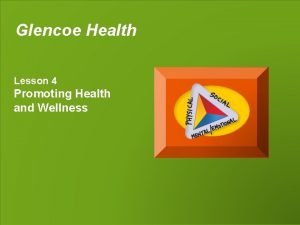Promoting Health and SelfAdvocacy for Persons with Intellectual

- Slides: 1

Promoting Health and Self-Advocacy for Persons with Intellectual and Developmental Disabilities: A Service-Learning Pilot Project for Community Health Education Students Debra L. Fetherman, Ph. D. , MCHES, ACSM-HFS INTRODUCTION § Adults with intellectual and developmental disabilities (IDD) are socioeconomically disadvantaged, experience poorer health outcomes and have unmet healthcare needs. § These adults are more likely to die of preventable causes and to die at an earlier age. § Community health educators are called to address the health inequities and health disparities facing our nation. § Service-learning (SL) creates relevant experiences in which students can learn firsthand about and serve this vulnerable population. OBJECTIVES § This SL pilot project was designed to: § Increase the health awareness and health self-advocacy skills of adults with IDD. § Develop student competencies in two Certified Health Education Specialist, Areas of Responsibility, VI. Serve as a Health Education Resources Person and VII. Communicate and Advocate for Health and Health Education. § Student Learning Outcomes (SLO), students will be able to: § SLO 1: Serve as a health education resource person. § SLO 2: Communicate and advocate for health and health education. § SLO 3: Describe how they can be a “person for others” in their role as a community health educator. § Poster presentation objectives: § Identify the critical phases of a University SL project for adults with IDD. § Describe the effectiveness of a University SL Project for adults with IDD. § Identify the learning outcomes of a University SL project for community health education students. METHODS § Junior-level health education majors (N=21) participated in a 12 -week SL project. § Adults with IDD (N=11) in intermediate care (n=2), family aid (n=4) and community living (n=5) were recruited through their support professional. § Groups of 2 – 3 students were matched with an IDD adults. Three students were matched individually. § Students reviewed 5 lessons from Vitale, Levitz and Crimmins (2007) My Health My Choice My Responsibility training program. § Adults received 3 -5 individualized health sessions. § All adults received sessions on physical activity and nutrition. PHASE CONCLUSION SL PROJECT SUMMARY ASSIGNMENT Orientation Week HIPAA Training video, quiz 1 -4 & acknowledgement form Review AAIDD website Overview SL site Social Media Policy Tour SL site Overview health session objectives Assessment/ Student group meetings Collaboration Meet with assigned Week 4 -5 adult/support staff Review adult profile Planning/ Student group meetings Development Review health session Week 5 -6 objectives and assessment Implementation Week 7 -11 Students conduct 3 -5 health sessions with adult Evaluation Week 9, Week 12 Class discussion meeting Mural Project SL time sheet RESULTS SLO Measurement Pre-SL Reflection Assignment, Letter to Myself N/A • The orientation and assessment phases were critical to the students’ understanding of the SL project. • The project created relevant experiences where students learned effectively about: 1) the health education profession and 2) serving adults with IDD. • The project evaluation could be improved by assessing the pre and post health awareness and health self-advocacy skills of the adults served. N/A Reflection journal entries each session 3 mural images Mural class activity Post-Reflection Assignment, Letter to Myself REFERENCES Cashman, S. B. , & Siefer, S. D. (2008). Service-learning, An integral part of undergraduate public health. American Journal of Preventive Medicine, 35(3), 273 -278. Champagne, N. (2006). Using the NCHEC areas of responsibility to assess service-learning outcome in undergraduate health education students. American Journal of Health Education, 37(3), 137 -145. Drum, C. E. , Krahn G. L. , & Bersani, H. (2009). Disability and Public Health. Washington, DC: American Association on Intellectual and Developmental Disabilities. Housman, J. , Meeney, K. S. , Wilcox, M. , & Cavazos, A. (2012). Impact of service-learning on health education students’ cultural competence. American Journal of Health Education, 43(5), 269278. Mc. Menamin, R. , Mc. Grath, M. , Cantillon, P. , & Mac. Farlene, A. (2014). Training socially responsive health care graduates: Is service learning an effective educational approach? Medical Teacher, 36(4), 291 -307. Nehring, W. M. (2005). Health Promotion for Persons with Intellectual and Developmental Disabilities: The State of Scientific Evidence. Washington, DC: American Association on Intellectual and Developmental Disabilities. Sabo, S. , de. Zapien, J. , Teufel-Shone, N. , Rosales, C. , Bergsma, L. , & Taren, D. (2015). Service learning: A vehicle for building health equity and eliminating health disparities. American Journal of Public Health, 105(S 1), S 38 -S 43. Vitale, M. , Levitz, M. , & Crimmins, D. (2007). My health, my choice, my responsibility: A training program on health selfadvocacy. Valhalla, NY: Westchester Institute for Human Development. ACKNOWLEDGEMENTS Thank you to the Community Health Education students and adults that participated in this SL project and pilot study.

